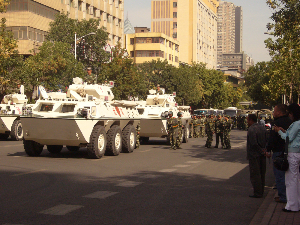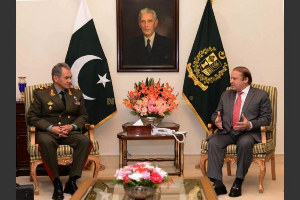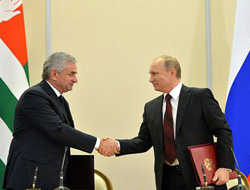Sanctions, Energy Prices, and Ruble Depreciation Challenge CIS Governments
By Stephen Blank (02/18/2015 issue of the CACI Analyst)
In early 2015, oil prices are in free fall and the ruble’s value is plunging along with it. Though Russia is the immediate target or victim of these trends the repercussions of its economic crisis are already manifesting themselves throughout the CIS and affecting the economies of Central Asian and South Caucasian states. Economic crisis due to falling energy prices immediately throws failures of economic and political governance, like excessive borrowing and vanity projects, into sharp relief. But when this occurs in tandem with the depreciation of the Russian ruble and the inability of Russian firms to access foreign capital, the challenges to these states, all of whom are to varying degrees connected to the Russian economy, grow by an order of magnitude.

Russia Increases Presence in Georgia's Energy and Transportation Markets
By Eka Janashia (01/22/2015 issue of the CACI Analyst)
At the beginning of 2015, Russia’s state-owned oil producer Rosneft entered Georgia’s oil retail market by purchasing a 49 percent stake of Petrocas Energy Ltd. Petrocas’ affluent assets include an oil terminal in Georgia’s Black Sea port of Poti with a capacity of 1.9 million tons per year as well as a network of 140 gas stations in Georgia under the Gulf brand.
By launching a joint venture with Pertocas, Rosneft will gain high-quality storage capacity in one of the major oil and oil products hubs in the region, enrich supply routes options and enhance its operations in the Central Asia and South Caucasus oil market. “[It] is a new milestone that will highlight the strategic importance of the South Caucasian energy corridor,” the main shareholder of Petrocas, Russian businessman David Iakobashvili said.
The opposition United National Movement (UNM) party insisted that Rosneft plans to acquire a controlling interest in Petrocas and called on the government to revoke a deal damaging to state interests. The government responded that it was during UNM’s term in power that Russian investments penetrated strategic areas of Georgia’s economy such as finances, electricity, chemicals, ore industry, food and dairy products. For example, at that time, the Russian state-owned electricity trader, Inter RAO, obtained 75 percent of Tbilisi’s electricity distribution company Telasi, thermal power generating plants, as well as the management right of two hydro power plants; Khrami I and Khrami II. The government also lamented that it has no right to influence private business, especially the decisions of Petrocas, which is registered in Cyprus and manages its operations from there.
UNM counter-argued that Rosneft operations in Abkhazia breach the Law on Occupied Territories and that the government is obliged to cancel the agreement granting the Russian company “the most important communications on the country’s Black Sea shore.”
Indeed, in 2009 Rosneft started offshore explorations and development of oil and gas fields in Abkhazia under an agreement signed between the company and Abkhazia’s de facto government. Against this background, three of Georgia’s government agencies began to study the legitimacy of the Rosneft-Petrocas deal. The results are yet unknown.
The recent deal reflects Russia’s strategy to strengthen its infrastructure capabilities in the South Caucasus to ensure an uninterrupted delivery of oil as well as other products to Armenia, which recently became a member of Eurasian Economic Union (EEU) but lacks land access to other EEU members in the absence of common borders. The reconstruction of the railway through Abkhazia and the planned Avro-Kakheti highway from Dagestan to eastern Georgia and then to Armenia, can be understood in this light.
While improving Armenia’s situation is Moscow’s key rationale, the Kremlin is also interested in consolidating its position in the Georgian market. UNM asserts that the Rosneft-Petrocas deal is only the beginning of “a big process” and unless countervailing measures are taken, “Moscow will have no obstacles at all.”
On January 17, Iase Zautashvili, the General Director of Airzena, Georgia’s national airlines, disclosed correspondence between Georgian and Russian state agencies regarding the prospect of restoring flights between the two countries. These clandestine negotiations aim to grant Russian companies a monopolistic position in Georgian airspace, Zautashvili said.
Referring to other covert correspondence taking place between the Russian and Georgian sides via the Swiss Embassy, UNM claims that 11 Russian companies, including Vladimir Putin’s Private Company, will enter Georgia’s airspace by dumping prices and eliminating the competition, including the national airlines, in order to obtain a monopolistic position in the Georgian market. The UNM also claims that some of these companies fall under the international sanctions against Russia while others have violated the Law on Occupied Territories.
The Enguri hydropower plant with a total capacity of 1,300 megawatts could become another target of Russian strategic interest. Russia allegedly intends to register Georgia’s most powerful hydroelectric station in the region in Abkhazia. Although Georgia’s Ministry of Energy categorically denies that the plant’s ownership is under discussion, Aslan Basaria, Director of Abkhazia’s power company Chernomorenergo, claims that negotiations have already been launched with participation of the Georgian side. “The plant is located on Georgian territory and belongs to the Georgian state. The Chernomorenergo Director General’s statement is far from reality,” the Ministry of Energy says. Despite the denial, Sokhumi in fact raised the question of the Enguri hydropower plant’s ownership a month ago when Abkhazia’s de facto leader Raul Khajimba said “what is located on our territory should be owned by the Abkhaz people.”
In fact, the Enguri generators are located on the territory of occupied Abkhazia while its arch dam is in the Georgian-controlled area. According to the informal agreement reached between Tbilisi and Sokhumi in the 1990s, Abkhazia gets 40 percent of the electricity generated by the plant free of charge while the rest goes to Georgia. The fact that the agreement terms are rather favorable to the Abkhaz side suggests that the questions raised over the plant’s ownership comes from Moscow, rather than Sukhumi.
Taken together, signs are emerging of several steps taken by Russia to make inroads into vitally important sectors of Georgia’s economy.
China's Silk Roads and Their Challenges
By Stephen Blank (01/07/2015 issue of the CACI Analyst)
Few realize that China is actually building three Silk Roads, one through Central Asia to Europe; a second, maritime one, through South East Asia to India and South Asia; and third, China is building a robust commercial network through the Arctic to connect it with Europe. In all three cases there is a common geopolitical dream that has been shared by Russian and Asian leaders since the opening of the Suez Canal: building a land-based alternative connecting East, South, and Central Asia to Europe by purely terrestrial means. China’s plans for Central Asia are extraordinarily ambitious but there are serious problems that could undermine them.

Russia's Pakistan Volte-Face
By Naveed Ahmad (01/07/2015 issue of the CACI Analyst)
Pakistan has signed a military cooperation pact with Russia, “aimed at bringing peace and stability in the region.” Leading a 41-member high level delegation on November 20, 2014, Russia’s Defense Minister General Sergei Shoigu flew to Islamabad to sign the milestone pact, whose details were not made public. On the invitation of Russian President Vladimir Putin, Prime Minister Nawaz Sharif will soon visit Russia. The move follows Russia’s decision to lift its self-imposed arms embargo on Pakistan in June despite opposition from its longtime ally India.

Russia Presses Ahead with Annexation of Abkhazia and South Ossetia
By Valeriy Dzutsev (11/26/2014 issue of the CACI Analyst)
On November 24, the Russian government signed an agreement with Abkhazia that will further diminish the already limited sovereignty of this territory in exchange for Russian investments and social benefits for the population. The South Ossetian government has signaled that Russia is preparing a similar agreement with this Georgian breakaway territory. Some South Ossetians, however, have unexpectedly spoken out in favor of retaining the republic’s sovereignty. As Russia lays the groundwork for the annexation of Abkhazia and South Ossetia, it encounters surprising opposition from the tiny republics that have become accustomed to a certain degree of independence from Moscow. Tighter control of Abkhazia and South Ossetia will increase the security risks for Georgia.







